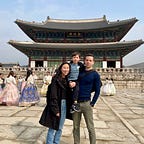The Best Books I Read in 2019
It’s 2021, which means I should be sharing my “Best Books I Read in 2020” list. But, I need to post my 2019 list first.
I didn’t write this list in 2019 because, honestly, I didn’t feel like anyone would care. But, a few friends said that they missed talking about what was on my list. So I’m publishing my 2019 list, albeit a year late.
A reminder of how these lists work:
I share books that I read in the year; not ones that were published that year. These books aren’t the “best” in some literary sense; they’re the ones I enjoyed reading the most, or whose ideas I’ve kept thinking about since then.
You can find the full list of books I’ve read on Goodreads, as well as lists from past years:
- The Best Books I Read in 2018
- The Best Books I Read in 2017
- The Best Books I Read in 2016
- The Best Books I Read in 2015
As usual, every year brings new questions and ambitions.
In 2019, my son grew from a watermelon I had to keep alive to a walking, talking watermelon. This raised questions like “What’s the best way to talk to this watermelon?” and “Why is the watermelon doing that?” So, I read a ton about child development.
My other big project was learning about climate change. As an engineer, I found this endlessly fascinating. The problems are important, frequent, painful, and underserved. The solutions are science fiction, and there are so many green fields. What’s not to like?
So with that, here are the best books I read in 2019:
Parenting
Most parenting books are uninformed bordering on harmful. I only found two that were good, and that’s because the insights apply to everyone — adults and children alike.
No Bad Kids
Kids are sailing in a constant storm of inputs, impulses, and emotions. They can barely understand much of it, let alone control it. Sometimes they’ll do bad things, and it’s natural for parents to think “Aaaahh crap, I got a bad one…”
No Bad Kids reminds parents that sometimes kids do bad things, but they’re not bad people.
Next time your kid loses control, stay calm and remind yourself that they’re more likely tired, hungry, or overwhelmed than actually bad. This also works with adults.
How to Talk So Kids Will Listen, and How to Listen to Kids Will Talk
This book is about how to effectively communicate with young kids.
The core message is to listen, label what’s happening, and explain. It’s much easier to say “Tidy up your play room.” than “I’ve asked you to tidy up your play room but you didn’t. Now I’m feeling frustrated. Why are you not cleaning?” The first might seem easier, but it’s harder in the long term.
Climate Change and Sustainability
Sustainable Energy Without the Hot Air
Reading Sustainable Energy Without The Hot Air is like being a fly on the wall watching a great engineer try to solve a hard problem.
The author creates a balance sheet of global energy usage — with production on one side and consumption on the other — and then tries to balance it using only sustainable energy. Basically, he takes a first principle, bottom’s up approach to figure out if we can ever get to net zero carbon.
Drawdown: The Most Comprehensive Plan Ever Proposed to Reverse Global Warming
An easy-to-read introduction to the 50 leading climate change solutions, stack ranked by cost and potential impact.
Drawdown was full of surprises — like reducing food waste or tropical reforestation being 10x more impactful than more futuristic solutions like clean aviation or offshore wind turbines.
Business and Innovation
The Mom Test
How to talk to customers and learn if your business is a good idea when everyone is lying to you.
A short, funny, tactical guide that teaches engineers to learn how to talk to people to understand their problems and build something they want.
Let My People Go Surfing
The story of Yvon Chouinard, the founder of Patagonia. It’s a really interesting meditation on how to build a business that pursues both profit and principles — in Patagonia’s case quality and conservation — at the same time. It’s not as well written as Shoe Dog, but Yvon and Patagonia are just as interesting.
Finally, Fiction
Noble House
James Clavell is the GOAT of Asian historical fiction. I’ve mentioned other Asian Saga books Shogun and Tai Pan in previous lists.
Noble House is the fifth book in the series. It’s an epic story taking place over a single week in 1960s Hong Kong, filled with bank raids, a stock market frenzy, espionage, Triads, Russians, natural disasters, and an epic feud between two families.
